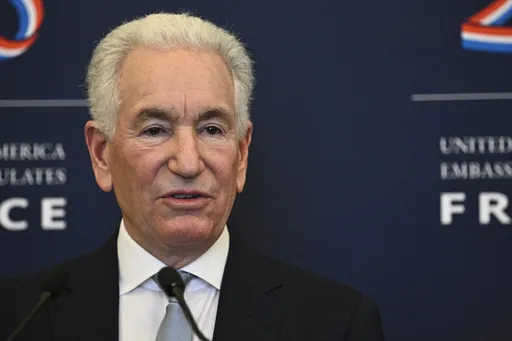The results from Hungary’s European Parliament (EP) elections showed the far-right ruling Fidesz party is still clearly the dominant political force in the country, but its domestic politics may have cost the group leverage on the international level.
Fidesz won a commanding 52 percent of the vote, garnering 12 of Hungary’s 21 seats. While it wasn’t a two-thirds majority, which Fidesz enjoys in the national parliament, Prime Minister Viktor Orban hailed it as a “record victory amid record turnout” after results were announced.
“Hungary is strong as the will of Hungarian voters is united. The result gives a strong mandate for Hungary”, Parliamentary and Strategic State Secretary of the Prime Minister's Office Balazs Orban said in a statement delivered to TRT World.
According to an analysis by Hungarian think tank Political Capital, “Fidesz’s advantage over its domestic opposition remains massive.”
The party, which has been described as far right, authoritarian and xenophobic by critics, “built on its increasing financial and organisational resource advantage guaranteed by the increasingly authoritarian political system”, the analysis stated.
Critics say Fidesz has consolidated control over domestic media outlets and use state resources for its own political campaigns.
This was the case for the “Stop Soros” campaign ahead of the 2018 national elections.
The campaign targeted Hungarian-American billionaire George Soros, which Fidesz has long painted as a liberal boogeyman who “encourages migration” with EU-level authorities.
The campaign has been derided as “anti-Semitic” by critics.
Fidesz was further accused by opposition politicians of violating spending campaign finance regulations by pushing their campaign message with government funds.
Far-right separations
Fidesz has been accused of not only using government funds for its own gain, but of targeting of the opposition through media and selected support of smaller parties.
For years, the main opposition party was Jobbik, which still holds the most seats of any opposition party in the national parliament. The party has a history of far-right, Eurosceptic, anti-immigrant and anti-Roma policy policies, but has softened its stance in recent years.
Jobbik suffered greatly in the EP elections, going from 14.67 percent of the vote in 2014 to roughly six percent in 2019. They will send one representative to the EP, down from three.
According to Political Capital’s analysis, Jobbik is “in survival mode at best”.
Far-right newcomers Our Homeland Movement (OHM), “which is strongly supported by government-controlled media, played its role in weakening Jobbik,” Political Capital said.
OHM won 3.3 percent of the vote, or roughly 113,000 votes, in its first EP election after positioning itself as a far-right alternative to Fidesz and Jobbik during the campaign.
OHM is led by Laszlo Toroczkai, a far-right politician was the vice president of Jobbik until last year, when he left over disagreements on the party’s softened image.
Ahead of the EP vote, OHM formed the “National Legion”, a paramilitary group that teaches military skills and “guard traditions”, while continuing the “idealism and altruism” of the Hungarian Guard, an outlawed paramilitary group founded in part by former Jobbik leader Gabor Vona.
OHM’s hardline campaign is assumed to have taken votes from Jobbik.
Jobbik ‘s mobilisation rate was 20 percent, when compared to its performance in the 2018 national election wherein the party garnered over one million votes. This means roughly 220,000 votes went to Jobbik, according to Political Capital.
In comparison, Fidesz saw a 67 percent mobilisation rate.
When asked for comment, Jobbik delivered a statement to TRT World that claimed “the "government wanted to destroy" them through methods such as "character assassinations, subversion attempts” and other means.
In response to Jobbik’s claims, Minister of the PM’s office Balazs Orban said in the statement delivered to TRT World that the “opposition is worried about the popularity of Fidesz”.
EU-wide role
While Fidesz may be popular at home, their position on the European level isn’t as firm as it once was.
The party has recently faced censure by the EP for its alleged backsliding on democratic norms, and its EP group, the centre-right European People’s Party, temporarily suspended Fidesz’s membership in March.
The party has flirted with the idea of joining the far-right anti-immigration EP bloque, the European Alliance of People and Nations (EAPN), headed by Italian Deputy Prime Minister Matteo Salvini.
While Fidesz has made enemies in the EPP – thanks in part to an anti-EPP election campaign that showed Soros with EU Commission chief and EPP member Jean-Claude Juncker accusing them of allegedly supporting illegal migration – it remains in the party’s interest to stay within the group.
Fidesz held more sway on the EU level within the EPP, which is still the EP’s largest group with an estimated 182 seats, giving it power to decide the EU budget.
However, Fidesz’s hardline campaigns against immigration, along with its control of media and concerns over the independence of its judiciary, may permanently exclude the party from the centre-right EPP.
“Fidesz sacrificed its positions in the European Parliament on the altar of domestic politics with an anti-EPP campaign”, Political Capital said.























